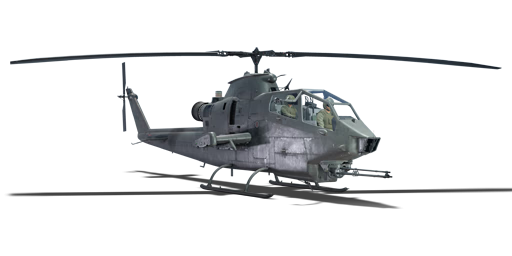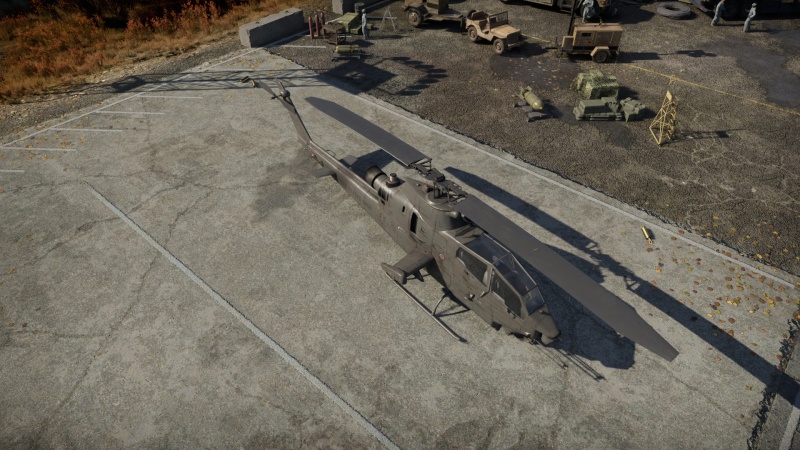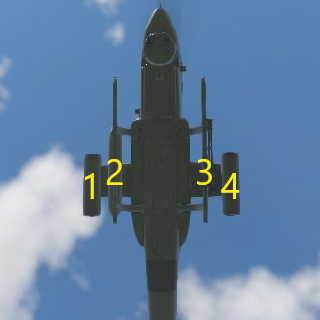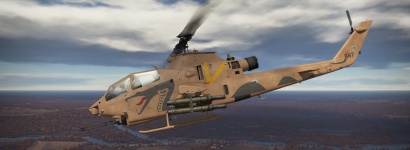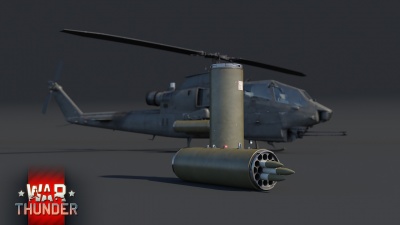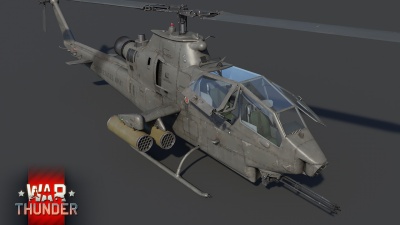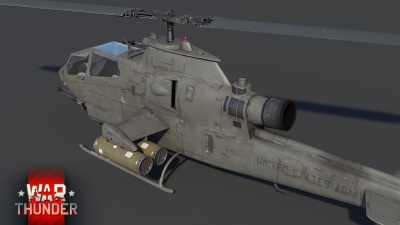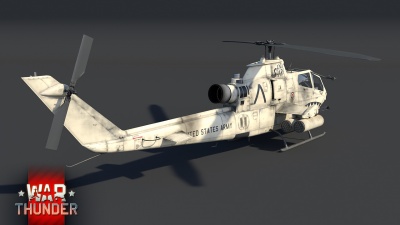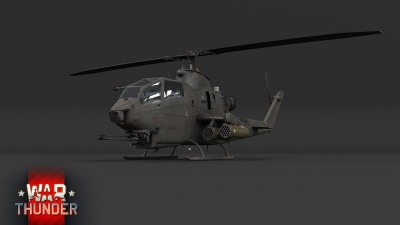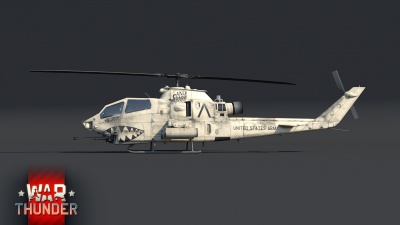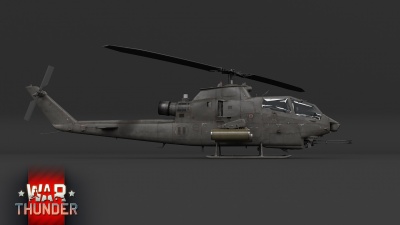Difference between revisions of "AH-1F"
(New Description Project - USA Priority: Helicopters - AH-1F) (Tag: Visual edit) |
(Minor edits to the link) (Tag: Visual edit) |
||
| Line 13: | Line 13: | ||
The Bell AH-1 Cobra is a single-engine attack helicopter designed and built by the American rotorcraft company Bell Helicopter. The AH-1F, a member of the renowned Huey family, is also known as the Huey Cobra or Snake. In general, the AH-1 was built as an interim gunship to meet the demands of the U.S. Army during the Vietnam War. A dedicated gunship was not conceivable during the early phases of the Vietnam War for a variety of reasons, most notably disagreements between the U.S. Air Force and the U.S. Army. At the same time, Bell had been studying helicopter gunships since the late 1950s, and it eventually convinced the U.S. Army that a dedicated gunship was required, prompting the U.S. Army to launch the Advanced Aerial Fire Support System (AAFSS) program in 1964. However, as the Vietnam War advanced to 1965, attacks on U.S. soldiers became more prevalent, and the AAFSS program became bogged down in technical difficulties and political disputes. The necessity for an immediate interim gunship for the Vietnam War became obvious, and the U.S. Army approached five different companies with their desire for an urgent solution. Bell’s Model 209 prototype (later renamed the AH-1 Cobra) took its first flight on September 7, 1965, and won the production contract against the other competing helicopters in April 1966. The US Army quickly signed the first production contract, ordering 110 aircraft in the first batch, and mass manufacturing of this helicopter began with little adjustment. Rapid follow-up purchases had boosted this to 500 Cobras by the end of the year. Overall, the Bell AH-1 Cobra employed the same engine, transmission, and rotor system as the Bell UH-1 Iroquois, which had already proven to be a viable platform during the war but added a revised narrow fuselage and other features. | The Bell AH-1 Cobra is a single-engine attack helicopter designed and built by the American rotorcraft company Bell Helicopter. The AH-1F, a member of the renowned Huey family, is also known as the Huey Cobra or Snake. In general, the AH-1 was built as an interim gunship to meet the demands of the U.S. Army during the Vietnam War. A dedicated gunship was not conceivable during the early phases of the Vietnam War for a variety of reasons, most notably disagreements between the U.S. Air Force and the U.S. Army. At the same time, Bell had been studying helicopter gunships since the late 1950s, and it eventually convinced the U.S. Army that a dedicated gunship was required, prompting the U.S. Army to launch the Advanced Aerial Fire Support System (AAFSS) program in 1964. However, as the Vietnam War advanced to 1965, attacks on U.S. soldiers became more prevalent, and the AAFSS program became bogged down in technical difficulties and political disputes. The necessity for an immediate interim gunship for the Vietnam War became obvious, and the U.S. Army approached five different companies with their desire for an urgent solution. Bell’s Model 209 prototype (later renamed the AH-1 Cobra) took its first flight on September 7, 1965, and won the production contract against the other competing helicopters in April 1966. The US Army quickly signed the first production contract, ordering 110 aircraft in the first batch, and mass manufacturing of this helicopter began with little adjustment. Rapid follow-up purchases had boosted this to 500 Cobras by the end of the year. Overall, the Bell AH-1 Cobra employed the same engine, transmission, and rotor system as the Bell UH-1 Iroquois, which had already proven to be a viable platform during the war but added a revised narrow fuselage and other features. | ||
| − | Introduced in the [ | + | Introduced in the [[Update "The Valkyries"]], the AH-1F was an upgraded variant of the AH-1S by including a head-up display (HUD), a laser rangefinder (IR), an IRCM mounted above the engine exhaust, an infrared suppressing engine exhaust system, and the M143 Air Data Subsystem (ADS). As a dedicated attack helicopter, it was outfitted with stub wings for various armaments, a chin-mounted gun turret, and an armoured tandem cockpit from which a gunner (front) and pilot (rear) operated it. Its design was inspired by the requirement for a dedicated armed escort for transport helicopters, allowing the latter to be more survivable in contested locations. As the AH-1F was one of the first cobras to be outfitted with thermal imaging equipment, it can quickly locate opponents in a crowded area and target enemy armour with its TOW/TOW-2 missiles. For lightly armoured targets, Hydra-70 M247 rockets are also available. |
== General info == | == General info == | ||
Revision as of 21:02, 5 August 2023
| This page is about the American attack helicopter AH-1F. For other versions, see AH-1 (Family). |
Contents
Description
The Bell AH-1 Cobra is a single-engine attack helicopter designed and built by the American rotorcraft company Bell Helicopter. The AH-1F, a member of the renowned Huey family, is also known as the Huey Cobra or Snake. In general, the AH-1 was built as an interim gunship to meet the demands of the U.S. Army during the Vietnam War. A dedicated gunship was not conceivable during the early phases of the Vietnam War for a variety of reasons, most notably disagreements between the U.S. Air Force and the U.S. Army. At the same time, Bell had been studying helicopter gunships since the late 1950s, and it eventually convinced the U.S. Army that a dedicated gunship was required, prompting the U.S. Army to launch the Advanced Aerial Fire Support System (AAFSS) program in 1964. However, as the Vietnam War advanced to 1965, attacks on U.S. soldiers became more prevalent, and the AAFSS program became bogged down in technical difficulties and political disputes. The necessity for an immediate interim gunship for the Vietnam War became obvious, and the U.S. Army approached five different companies with their desire for an urgent solution. Bell’s Model 209 prototype (later renamed the AH-1 Cobra) took its first flight on September 7, 1965, and won the production contract against the other competing helicopters in April 1966. The US Army quickly signed the first production contract, ordering 110 aircraft in the first batch, and mass manufacturing of this helicopter began with little adjustment. Rapid follow-up purchases had boosted this to 500 Cobras by the end of the year. Overall, the Bell AH-1 Cobra employed the same engine, transmission, and rotor system as the Bell UH-1 Iroquois, which had already proven to be a viable platform during the war but added a revised narrow fuselage and other features.
Introduced in the Update "The Valkyries", the AH-1F was an upgraded variant of the AH-1S by including a head-up display (HUD), a laser rangefinder (IR), an IRCM mounted above the engine exhaust, an infrared suppressing engine exhaust system, and the M143 Air Data Subsystem (ADS). As a dedicated attack helicopter, it was outfitted with stub wings for various armaments, a chin-mounted gun turret, and an armoured tandem cockpit from which a gunner (front) and pilot (rear) operated it. Its design was inspired by the requirement for a dedicated armed escort for transport helicopters, allowing the latter to be more survivable in contested locations. As the AH-1F was one of the first cobras to be outfitted with thermal imaging equipment, it can quickly locate opponents in a crowded area and target enemy armour with its TOW/TOW-2 missiles. For lightly armoured targets, Hydra-70 M247 rockets are also available.
General info
Flight performance
The AH-1F has a single turboshaft T53-L-703 power plant, which provides up to 1800 shp (transmission limited to 1290) & 210 kgf with a mass of 350 kg. This turboshaft engine is able to push the AH-1F to speeds in excess of 277 km/h whilst carrying wing mounted armaments.
| Characteristics | Max Speed (km/h at 1,000 m) |
Max altitude (metres) | |
|---|---|---|---|
| AB | RB | ||
| Stock | 258 | 247 | 3475 |
| Upgraded | 288 | 277 | |
Survivability and armour
The AH-1F is an armoured attack helicopter offering protection to the crew and engine:
- Composite boron carbide seat enclosures, for both of the crew, with a thickness of 20 mm.
- A steel seat, which offers a thickness of 12 mm for the pilot only.
- Steel plate covers, offering 12 mm of thickness over the turboshaft engine.
The AH-1F compensates with its small and nimble size compared to the Mi-24 Hinds which are incredibly well armoured but are huge and slow in comparison. However, the AH-1F does not protect all of its critical components, such as: fuel tanks, transmission, propeller shaft & control surfaces with armour plating. Nor does it have armoured glass installed around the cockpit.
Modifications and economy
Armaments
| Ballistic Computer | ||
|---|---|---|
| CCIP (Guns) | CCIP (Rockets) | CCIP (Bombs) |
| |
|
|
Offensive armament
The AH-1F is armed with:
- 1 x 20 mm M197 cannon, chin turret (750 rpg)
Suspended armament
The AH-1F can be outfitted with the following ordnance presets:
- Without load
- 28 x Hydra-70 M247 rockets
- 76 x Hydra-70 M247 rockets
- 4 x BGM-71C Improved TOW missiles
- 8 x BGM-71C Improved TOW missiles
- 4 x BGM-71D TOW-2 missiles
- 8 x BGM-71D TOW-2 missiles
Custom loadout options
| 1 | 2 | 3 | 4 | ||
|---|---|---|---|---|---|
| Hydra-70 M247 rockets | 7, 19 | 7, 19 | 7, 19 | 7, 19 | |
| BGM-71C Improved TOW missiles | 2, 4 | 2, 4 | |||
| BGM-71D TOW-2 missiles | 2, 4 | 2, 4 |
Usage in battles
When playing the AH-1F, select the helipad which is in the ideal tactical location for your playstyle. Climb to around 1500 meters, find a target, then descend on to them. It is critically important that you engage them from the rear of side. This way, it reduces their awareness of you, since they will be looking forward, this will help you by making the adversary become disoriented when attacked. This will give you a stealthy advantage, like a ninja. Advancing onto the target, come in as fast as possible, then slow down quickly, by raising the noise of the helicopter up. When slowed down, Engage the sight stabilizer and fire the tow missile and guide it onto the target.
If the target starts moving, rolling or starts trying to evade, keep the missile on the target and adjust to what your adversary is doing. Until you see an explosion, the target going down in flames whilst the reward and notification are showing up.
If out of the range, the missile will self-detonate and could give your position away, if your adversary looks around.
| Remember, you only have around one and a half miles before the missiles will detonate by themselves, so you can only carry either 4 or 8 BG-71 Tow missiles at a time. |
To overcome this, with enough time spent playing with the BG-71 missiles, you will be able to determine when you are within range based on your experience. This also applies to any other type of missile in the game too.
When engaging in Close quarters combat with other helicopters, the biggest threats are air-to-air missiles. Since the AH-1F only offers limited protection against them with countermeasures with its IRCM module. This means you need to stay alert, active & on the lookout for fast moving dots. If you see a small fast dot heading towards you, make very sharp abrupt turns, change height at the same time while turning and rolling.
| These are the biggest threats to you in battle, since they can carry air-to-air missiles. |
- AH-1Z Viper
- Mi-24P Hind
- Mi-24V Hind
- Mi-35M
- Ka-50
- SA.341F Gazelle
- SA.342M Gazelle
- EC-665 Tiger HAD
- EC-665 Tiger HAP
- EC-665 Tiger UHT
| Do keep in mind that you may be able to shoot down missiles with the installed 20 mm triple rotary M197 cannon. |
When engaging other helicopters, the triple barrel rotary cannon makes short work of any adversary. Make sure to load it with the air target belt, aim for critical elements of the rival helicopters such as cockpit, engine and fuel tanks.
Ground forces
Playing the AH-1F in ground forces, it is recommended to load up the 8x BG-71 Tow missiles & 38x FFAR Might mouse missiles. The BG-71 will give you the penetration at range in order to terminate tankers and with safety from the Anti-Aircraft Missile equipped anti-air vehicles. It is a wise tactic that Anti-Aircraft Missile equipped anti-air vehicles to be terminated first. Then once terminated, move into the battlefield and dominate the tanks with the 38 x FFAR Might mouse missiles, which can cause a lot of damage and could potentially terminate up to 38 tanks with well-placed shots.
The ideal tactic is to utilise the helicopter and the terrain. Such as maps which have forests and lots of tree lines, stay low over the trees and select your targets based on the threat to yourself first, then the impact to the team.
For example, if you have seen no enemy SPAA vehicles or other helicopters, climb in height, hover, then fire one or two missiles. Then quickly break off the hover and move to another part of the map, this way it allows you to stay undetected, remain stealthy and become a major threat to the enemy team.
Handling radar and Surface to Air missiles, when an enemy missile equipped SPAA is achieving a lock on, you will be notified with red arrows on the screen saying radar. To break the lock start rolling, gaining speed and the arrows will go away. If you are not successful, keep a close watch around the helicopter. At this, you will see white smoke coming from the ground, make very sharp abrupt turns. Change height at the same time while turning and rolling to avoid the missile.
| Keep a close watch out for airplanes and other attack helicopters! |
Pros and cons
Pros:
- 20 mm is effective against light armor
- Great manoeuvrability
- Very agile, with secondary load outs installed
- Great acceleration, very quick
- Good secondary weapon loadout
Cons:
- No flares
- Cannot equip air-to-air missiles
- 3.75 km range on its air-to-ground missiles
History
The AH-1F was born as the last iteration of the single engine variant of the Cobra helicopters. The development of this model can be traced back to the AH-1Q Huey Cobra, which was basically an AH-1G with several systems attached to it, such as the XM65 TOW missile subsystem (which allowed it to operate the BGM-71 TOW), M73 reflex sight and a Telescopic Sight Unit (TSU). All 92 of the AH-1Q's were AH-1G's that had been modified. After this model was tested, it was determined that the helicopters lacked the horsepower to perform NOE flight and a few upgrades such as a new more powerful T53-L-703 engine with a 1800 hp output, and several electronic changes were made to it. By this moment, it was known as AH-1S (Mod) or Modified. Eventually, all of the AH-1Q's were reworked and updated to AH-1S (Mod) or later variants.
The AH-1S had also several modernizations, known as "Step" modernizations. The AH-1S Step I (Also known as AH-1P) modernization program with the upgrades listed above, and a new cockpit that included composite materials to enhance protection. The AH-1S Step 2 (Also known as AH-1E) introduced the Enhanced Cobra Armament System (ECAS), which included the 20 mm M197 rotary cannon, fitted into a M97A1 turret system.
The AH-1F Included both the Step I and II upgrades, alongside upgrades on its armament system, a laser rangefinder, an IR suppressor mounted on the engine exhaust, and a IR dazzler, mounted on top of the engine. One Prototype Model 249, a AH-1S with a 4 bladed main rotor system, was created to be sold to US Army as an armed scout for the Apache Helicopter with advanced sighting systems that could also carry Hellfire missiles but was not purchased. The Model 249 was also offered to Germany as a proposed Attack helicopter but was also not purchased.
Media
- Skins
- Images
- Videos
See also
- Related development
- Bell AH-1 Cobra
- Aircraft of comparable role, configuration and era
- Agusta A129 Mangusta
External links
| Bell Aircraft Corporation | |
|---|---|
| Aircraft | |
| Fighters | P-39N-0 · P-39Q-5 |
| P-400 | |
| P-63A-10 · P-63A-5 · P-63C-5 · ␠Kingcobra | |
| Jet Fighters | P-59A |
| Export | ▂P-39K-1 · ▂Pokryshkin's P-39N-0 · ▂P-39Q-15 · ▄P-39Q-25 |
| ▂P-63A-5 · ▂P-63A-10 · ▂P-63C-5 · ▄P-63C-5 | |
| Helicopters | |
| Attack | AH-1F · AH-1G · AH-1Z · AH-1W |
| OH-58D | |
| Utility | UH-1B · UH-1C · UH-1C XM-30 |
| Export/Licensed | ▅UH-1B · ◄UH-1D |
| Tzefa A · Tzefa B · Tzefa D/E · ▅AH-1S early · ▅AH-1S · ▅AH-1S Kisarazu · ␗AH-1W | |
| ␗OH-58D | |
| See Also | Fuji Heavy Industries · Agusta |
| USA helicopters | |
|---|---|
| Attack | |
| Black Hawk | MH-60L DAP |
| Choctaw | H-34 |
| Cobra | AH-1F · AH-1G · AH-1Z |
| SuperCobra | AH-1W |
| Kiowa | OH-58D |
| Little Bird | AH-6M |
| Apache | YAH-64 · AH-64A · ▃AH-64A Peten · AH-64A (GR) · AH-64D |
| Utility | |
| Huey | UH-1B · UH-1C · UH-1C XM-30 |


